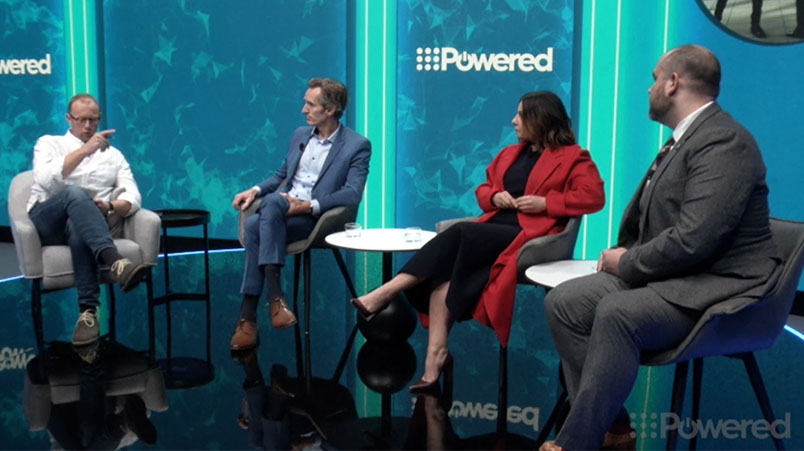Treacher v Ritson: The fundamentals have changed - consumers won’t 'snap back' to pre-COVID behaviour

L to R: Mi3 Executive Editor Paul McIntrye is joined by The Brand Institute CEO Karl Treacher, Canstar Editor-at-Large Effie Zahos and Nine's Director of Strategy, Insights & Effectiveness - Powered, Toby Boon.
It’s the debate du jour – how deep and lasting will consumer behaviour change because of COVID-19? Yes, Mark Ritson says spending and behaviours will unquestionably “snap back” - after COVID and a hard recession - but another marketing professor and CEO of The Brand Institute, Karl Treacher, argues attitudes and behaviour are fundamentally shifting. Here’s why.
Half of Australians are living “pay cheque to pay cheque”. The $18 billion that has been pulled early by Australians from their superannuation funds as part of the Government’s COVID stimulus program has been partly used to reduce debt – credit cards, for example – but gambling and groceries were the second and third biggest areas in which people blew their retirement money in the past three months, according to Canstar’s Editor-at-Large, Effie Zahos.
Zahos joined Karl Treacher, CEO at The Brand Institute, and Nine’s head of Strategy, Insight and Effectiveness, Toby Boon on a panel at Nine’s Big Ideas Store on what next for consumers, spending and attitudes.
While Mark Ritson is steadfast on very little changing on the other side of COVID and a recession, Zahos, Treacher and Boon are seeing new data that suggests otherwise
Zahos says most worrying are the figures around financial management, with one in every two Australian living pay week to pay week.
"That hit home when they announced that we could access our super funds,” says Zahos. “We have used that as our emergency money because we do not have a thousand dollars sitting in an account.”
Zahos cites data released by illion and Alphabeta showing that of those that took $18.1 billion out of super during COVID, "$3000 was instantly spent in that first fortnight when compared to people's discretionary spending in the previous fortnight.
"What was concerning was gambling was second and then groceries third. So it's probably not where we were hoping the money to go to. But what this is saying is that we didn't have an emergency fund."
It’s data like this that Karl Treacher says indicates bigger consumer change is brewing – Treacher is currently on secondment as an Executive Director with one of the big four banks - he won't say which one - and is providing C-suite brand and reputation counsel to a range of boards and executive teams. Treacher's credentials are in marketing but he specialises in the social sciences.
“It takes us on average, 66 days to form a habit so when you have people in lockdown throughout the country for 100 days - Victoria's going back for another many days - there's new patterns that have been established here, new ways of working, new realities for people that invariably will change the way that they move forward post COVID. The way that they live their lives, it's a fundamental shift.”
Treacher cites an example in which an investment property may have been on the consideration list pre-COVID but now people will instead likely “buy a house with a bigger backyard” to accommodate children having a great time because a COVID-like scenario may end up being a more permanent situation. “The statistics reflect that sort of behaviour,” Treacher says.
Zahos agrees. “The behaviours certainly that have been established at the moment, consumers will take with them,” she says. “And I think it's the industry itself that needs to kind of adapt with that. When we look at commercial properties and what we're hearing from the retailers, that is going to be an interesting area as to how it pans out. A lot of us had never had an emergency fund. So I think that is definitely going to be a lesson moving out from here. Whether it's a healthy emergency fund or not is anybody's guess. There’s definitely some money behaviours that come out of this and those that do spend are going to spend more cautiously.”
Toby Boon says Nine’s consumer pulse tracking data suggests the same. Two weeks ago “things were looking very different” he says. Boon expects the new surge in COVID cases to have a much deeper impact on consumers feeling confident and comfortable.
"There's this idea of a 'COVID Coaster'," he says. "We've been building up this national sense of anticipation for good things on the horizon and when that news coming out of Victoria hit us all, it sent everything into a dip."
"There are times when we're states and times when we're one nation and we can now really start to see the knock on impact it's having [on overall consumer confidence] as a nation.”
You can watch the full Consumer Pulse Live debate at Nine’s Big Ideas Store here, moderated by Mi3’s Executive Editor Paul McIntyre.
